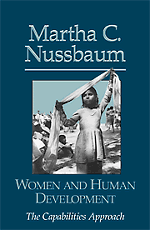CHAPTER TWO - ADAPTIVE PREFERENCES AND WOMEN'S OPTIONS
Published online by Cambridge University Press: 05 June 2012
Summary
The doctor was rightly upset about [the unsanitary conditions in the women's quarters]; but he was wrong in one respect. He thought that it was a source of constant pain for us. Quite the contrary … To those with low self-regard, neglect does not seem unjust, and so it does not cause them pain. That is why women feel ashamed to be upset about the injustice they encounter. If a woman must accept so much injustice in the life ordered for her, then it is perhaps less painful for her to be kept in total neglect; otherwise, she is bound to suffer, and suffer pointlessly, the pain of injustice, if she cannot change the rules governing her life. Whatever the condition that you kept us in, it rarely occurred to me that there was pain and deprivation in it.
Rabindranath Tagore, “Letter from a Wife”When we make videos, and women like us watch them, we get confidence to try and make changes. When we see women like us who have done something brave and new, then we get the confidence that we can learn something new too. When poor women see other poor women as health workers on the video, they say, “I can also learn about health and help solve these problems in my neighborhood.” When other selfemployed women see me, a vegetable vendor, making these films, they also have the confidence that they can do things which at first seem impossible.
Lila Datania, SEWA, Ahmedabad, 1992- Type
- Chapter
- Information
- Women and Human DevelopmentThe Capabilities Approach, pp. 111 - 166Publisher: Cambridge University PressPrint publication year: 2000
- 1
- Cited by

